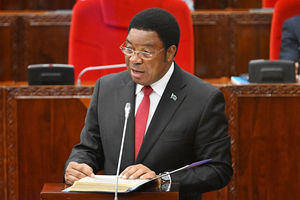JPM needs to ‘talk to the people’

President John Magufuli reads a poster when addressing Arusha residents last week. He is advised to talk to the people regularly. PHOTO | AGENCY
What you need to know:
As he was nearing his re-election US President Barack Obama had this to say about some of the failures of his first term in office:
Dar es Salaam. Presidents need to talk to the public, to tell a story to the people and to communicate to their electorates.
As he was nearing his re-election US President Barack Obama had this to say about some of the failures of his first term in office:
““When I think about what we’ve done well and what we haven’t done well… the mistake of my first term - couple of years - was thinking that this job was just about getting the policy right.
And that’s important. But the nature of this office is also to tell a story to the American people that gives them a sense of unity and purpose and optimism, especially during tough times.”
President Obama admission of failure to communicate to his people was genuine.
The importance and benefits a president being able communicate his or her electorate are too much to quantify. Not only does it enable the public to become aware of a president’s implementation of his/her policies and future plans.
A president who communicates is able to update the public on what he has done, of what he is doing, of which difficulties he is encountering on whatever he has been doing or plans to do.
It also helps to prepare the people psychologically to face hard times or hard decisions that the president plans to take and that might affect them all or some of them, for example, the Bomoabomoa, exercise.
When the people realise that their president is trying to talk to them directly they feel valued. They feel the president cares about them and is fighting for them.
And this makes it easier to mobilise them for major developments endeavours that would need their support and their energy, such as providing some manpower on voluntary basis in building some projects.
And the at the end of the day, if a president fails in what he had promised to do, people would forgive him/her because they would know that he tried, that he clearly showed, through his communications and his frequent updates, that he tried.
After the duty of a human being is to try hard and intelligently to achieve something. Success, very often, is beyond the control of man.
But for a president to be able to communicate well with his people he or she must be ready and able to deliver. His intentions must be genuine and his conscience clear. He must diligently love his people and wish for their wellbeing.
He must be ready to work hard for the good of his people. Anything in the opposite of these qualities will make his communications to his people sound empty, artificial and hypocritical.
If he seem to be a hard worker and determined to improve things but does not communicate, people will doubt his intentions. They will be puzzled by the secrecy, the silence.
President John Magufuli’s communication strategy since he has been at the helm has not been very forthcoming.
He has not been able to communicate directly with the people well enough, considering the many actions he has taken that affected the people and which necessitated constant communication.
Yet he needs to talk to the people. If he wants to sustain his anti-corruption stance; if he wants to reinstate the rule of law and discipline in the civil service; if he wants to take Tanzania from where it is now to a better future he needs to talk constantly to the people. Why? Because his work will be extremely difficult. He will find all sorts of obstacles from powerful elements within and outside the ‘system’ who benefited a lot from the status quo.
And it is there that he would need all the moral support he could garner from the people. He needs vivid people’s backing in all the good things that he does, however difficult they might be for the people for the time being.
And the support is there. It just needs to be harnessed. His actions since he was sworn in as President on November, 6 last year have already made him a hugely popular figure. Last week’s trip to Arusha is a case in point.
Arusha, as it is known, is an opposition stronghold. But the warn reception he received from the masses speaks volume.
How Dr Magufuli can communicate to the people
Dr Magufuli’s presidency has reminded many people of the integrity and credibility of founding President Mwl Julius Nyerere. It is, obviously, too early to start making such comparisons, but Dr Magufuli could borrow a leaf from Mwl Nyerere’s leadership style and substance, and especially from Mwalimu’s communication style.
Mwl Nyerere was a communicator-in-chief. His personality; his simplicity, his charisma and his good intensions communicated to the people in a special way.
But he also capitalised on that and found various ways to talk to the people. He held live press conferences that would be preceded by an hour long speech.
He went to the radio and addressed the nation directly, sometimes for hours, explaining complex international issues in very simple language that made everybody understand. He spoke frequently in public rallies at the Jangwani grounds or Lumumba Street. He spoke to the nation through Dar es Salaam or Dodoma elders.
He toured the country extensively went deep into the interior stopping in most of the villages that he passed through. There is an iconic picture of Mwl Nyerere standing on a Land rover waiting for a village chairman who had been in his farm unaware that the President was holding a rally in his village Ruvuma region. Mwalimu had made an unscheduled stop in the village and wanted the chairman to answer some queries from the villagers.
The fact that Mwl Nyerere was able to implement policies, some of which had big, adverse effects to the lives of the people, is because he knew how to convince and move masses.
At times he hard to use force to mobilise the people, but he always came out of it clean. When people wanted to express their displeasure or anger they usually chose somebody else to blame.
And when he failed and threw in the towel in 1985 people appreciated his honest and, I believe, forgave him and moved on.
They knew he tried and he had the best interests of Tanzania and Tanzanians at heart.
Dr Magufuli is not Nyerere and so he can choose his manner and style to communicate to the people.
There are various ways for him to do it. The best thing is to keep communicating.




